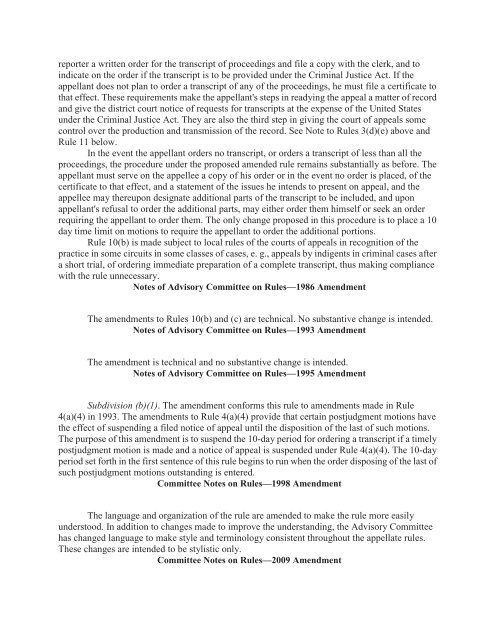Federal Rules of Appellate Procedure 2014-2015, 2014a
Federal Rules of Appellate Procedure 2014-2015, 2014a
Federal Rules of Appellate Procedure 2014-2015, 2014a
You also want an ePaper? Increase the reach of your titles
YUMPU automatically turns print PDFs into web optimized ePapers that Google loves.
eporter a written order for the transcript <strong>of</strong> proceedings and file a copy with the clerk, and to<br />
indicate on the order if the transcript is to be provided under the Criminal Justice Act. If the<br />
appellant does not plan to order a transcript <strong>of</strong> any <strong>of</strong> the proceedings, he must file a certificate to<br />
that effect. These requirements make the appellant's steps in readying the appeal a matter <strong>of</strong> record<br />
and give the district court notice <strong>of</strong> requests for transcripts at the expense <strong>of</strong> the United States<br />
under the Criminal Justice Act. They are also the third step in giving the court <strong>of</strong> appeals some<br />
control over the production and transmission <strong>of</strong> the record. See Note to <strong>Rules</strong> 3(d)(e) above and<br />
Rule 11 below.<br />
In the event the appellant orders no transcript, or orders a transcript <strong>of</strong> less than all the<br />
proceedings, the procedure under the proposed amended rule remains substantially as before. The<br />
appellant must serve on the appellee a copy <strong>of</strong> his order or in the event no order is placed, <strong>of</strong> the<br />
certificate to that effect, and a statement <strong>of</strong> the issues he intends to present on appeal, and the<br />
appellee may thereupon designate additional parts <strong>of</strong> the transcript to be included, and upon<br />
appellant's refusal to order the additional parts, may either order them himself or seek an order<br />
requiring the appellant to order them. The only change proposed in this procedure is to place a 10<br />
day time limit on motions to require the appellant to order the additional portions.<br />
Rule 10(b) is made subject to local rules <strong>of</strong> the courts <strong>of</strong> appeals in recognition <strong>of</strong> the<br />
practice in some circuits in some classes <strong>of</strong> cases, e. g., appeals by indigents in criminal cases after<br />
a short trial, <strong>of</strong> ordering immediate preparation <strong>of</strong> a complete transcript, thus making compliance<br />
with the rule unnecessary.<br />
Notes <strong>of</strong> Advisory Committee on <strong>Rules</strong>—1986 Amendment<br />
The amendments to <strong>Rules</strong> 10(b) and (c) are technical. No substantive change is intended.<br />
Notes <strong>of</strong> Advisory Committee on <strong>Rules</strong>—1993 Amendment<br />
The amendment is technical and no substantive change is intended.<br />
Notes <strong>of</strong> Advisory Committee on <strong>Rules</strong>—1995 Amendment<br />
Subdivision (b)(1). The amendment conforms this rule to amendments made in Rule<br />
4(a)(4) in 1993. The amendments to Rule 4(a)(4) provide that certain postjudgment motions have<br />
the effect <strong>of</strong> suspending a filed notice <strong>of</strong> appeal until the disposition <strong>of</strong> the last <strong>of</strong> such motions.<br />
The purpose <strong>of</strong> this amendment is to suspend the 10-day period for ordering a transcript if a timely<br />
postjudgment motion is made and a notice <strong>of</strong> appeal is suspended under Rule 4(a)(4). The 10-day<br />
period set forth in the first sentence <strong>of</strong> this rule begins to run when the order disposing <strong>of</strong> the last <strong>of</strong><br />
such postjudgment motions outstanding is entered.<br />
Committee Notes on <strong>Rules</strong>—1998 Amendment<br />
The language and organization <strong>of</strong> the rule are amended to make the rule more easily<br />
understood. In addition to changes made to improve the understanding, the Advisory Committee<br />
has changed language to make style and terminology consistent throughout the appellate rules.<br />
These changes are intended to be stylistic only.<br />
Committee Notes on <strong>Rules</strong>—2009 Amendment


















